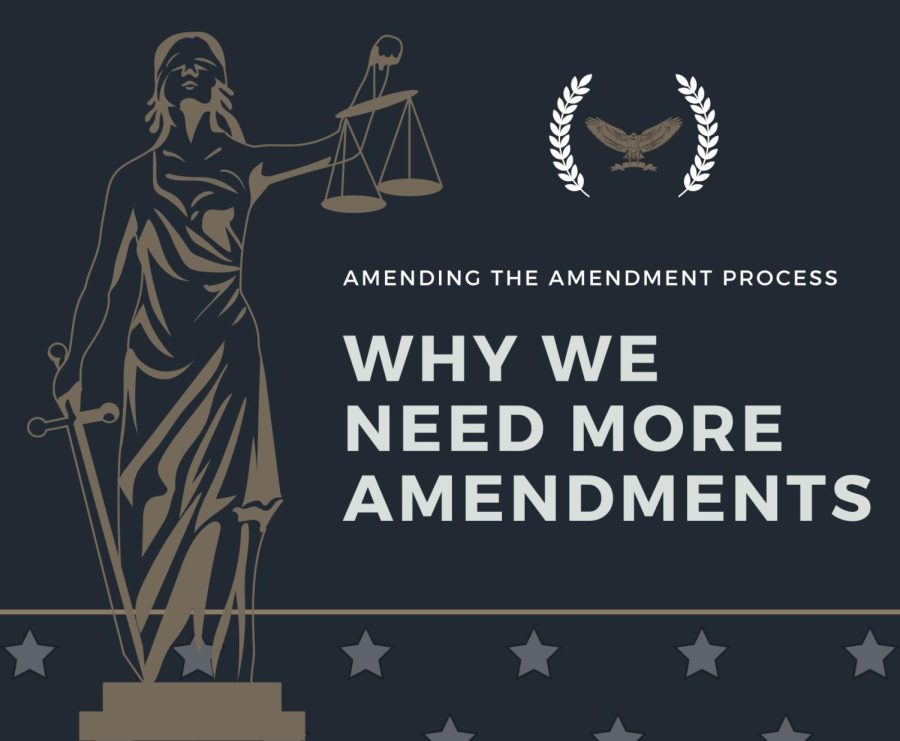We need to amend the amendment process
Our current amendment process makes it difficult to actually pass and ratify amendments. It is time for a change.
February 7, 2023
Since 1787, America has passed 27 amendments – an average of an amendment every eight years. The most recent meaningful one – the 26th amendment giving the right to vote to 18-year-olds – was passed more than 50 years ago.
Today, with the Constitutional problems in America growing, we need more amendments to address these issues. However, it doesn’t seem like today’s growing polarization will allow another amendment to pass. The solution: amend the amendment process.
The problem
Article V of the Constitution details the process of amending the Constitution. The process is difficult: over two-thirds of Congress and three-fourths of states must agree for an amendment to become a part of the Constitution.
However, with a growing divide in population between the largest and the smallest states, just four percent of Americans can stop an Amendment from being ratified. Although there have been over 11,000 proposed amendments, only 33 made it past the first Congressional phase, where six of these died within the state-ratification phase.
Among these is the Equal Rights Amendment, a popular amendment that more than 75 percent of Americans support, yet did not pass the ratification phase. Recently, the 38 states needed to ratify the amendment were reached, yet due to the artificial deadline within the proposal, it did not become a part of the Constitution. Despite supermajority support, there have been no recent developments in new amendments.
If we do not change the amendment process, we leave the process of constitutional change and interpretation to the Supreme Court, which currently contains its problems of politicization, secrecy, and legitimacy.
Although change can occur through the Supreme Court, if the United States does not have a backup option through the amendment process, the problems in America may worsen.
The solution
To fix the amendment process, the United States must pass an amendment itself that can lower the threshold for proposal and ratification – or change the system altogether.
One proposal is adding an aspect of popular sovereignty, similar to the proposition system in California, where a supermajority of Americans can decide whether to ratify a proposed amendment. Instead of the states ratifying the Constitution, the people can now have a say in fundamental changes to the document.
The limit can be set to 75 percent of Americans to prevent arbitrary change. This way, the proposed amendment, if ratified, has a high chance of being apolitical; it isn’t to the whims of the political parties or mobocracy.
Another possible solution is to lower the proposal rate within Congress by lowering the two-thirds requirement to three-fifths lower. Given the increased polarization of Congress, where standoffs have become increasingly common, chances of cross-party compromise have become unlikely due to more extremist views within Congress.
By lowering the threshold, amendments may move onto the second – and possibly harder – stage of ratification by the states or people. Yet, if the amendment is not proposed, then no changes can occur.
What amendments would we consider?
Changing the amendment process may be easier than deciding which amendments to add.
One example is by removing the criminality clause of the thirteenth amendment, where slavery is outlawed “except as a punishment for crime.” This clause led to modern-day issues with mass incarceration and prison-industrial complexes, where modern-day slavery can still exist by convicting people of crimes and forcing them into labor. Striking out the clause can ameliorate the issue.
Another example is a more conservative-supported amendment that wants to repeal the 17th amendment that allows the direct election of senators. Removing the 17th amendment could allow for more state sovereignty and reinstitute federalism before the Progressive era. Some argue that it acts as extra protection against an unlimited government that will not negatively affect corruption within the Senate.
By amending the amendment process, the United States may even have the opportunity to ratify these amendments into becoming the fundamental law of the land. These proposed amendments can bring positive changes – without making the entire process arbitrary.





